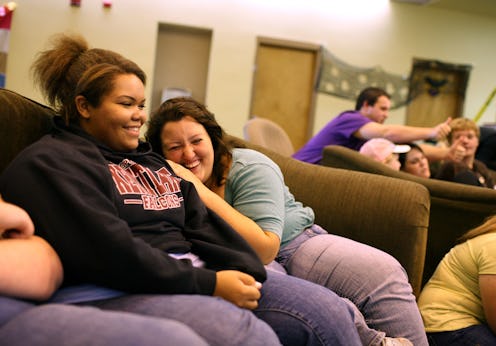News
How Friends Are Good For Your Health
Plenty of time and money has gone toward researching the human genome, but it turns out that we humans are pretty good at sequencing DNA without any tools at all. A new study released this week finds that people who are friends have more DNA in common with each other than strangers do. Because people generally choose who they become friends with, this means that when we’re forming friendships, we’re actually seeking out people who are genetically similar to us.
“Humans are unique in that we create long-term connections with people of our species,” one of the researchers said in an interview. “Why do we do that? Why do we make friends? Not only that, we prefer the company of the people we resemble.”
They found that the most commonly-shared gene between friends was the olfactory, or sense of smell. This actually makes a good amount of sense: Much of a friendship, of course, boils down to eating things together, and your sense of smell is related to your perception of taste and flavor.
But this is just the tip of the iceberg. Over the last several decades, numerous studies have shed a light on the importance that friendship plays in our lives. Let’s take a look at some of them.
Friends Make You Less Stressed (If You're A Woman)
It’s long been held that humans, when confronted with danger or intense stress, default to a “fight-or-flight” response, but one UCLA study turned that conventional wisdom on its head. It seems that, when it comes to women, “fight-or-flight” isn’t as strong as “tend-and-befriend.” In other words, women are more inclined to respond to perceived threats by nurturing their loved ones and seeking social contact with each other. This, in turn, releases oxytocin, which acts as a de-stresser in women (less so in men).
But it doesn’t stop there: When a woman’s “tend-and-befriend” impulse is successful, her body releases more oxytocin — and so the cycle repeats itself. As a result, women who spend a lot of time with their friends are likely to be much less stressed on a consistent, everyday basis than their male counterparts. It’s even been hypothesized that this may partially explain why women live longer than men.
Friends Affect Your Weight
In an even longer study — this one spanned from 1971-2003 — researchers looked at the prevalence of obesity in 12,067-person social network. They found that, in general, people were more likely to become obese if somebody close to them was also obese, which is a rather incredible discovery. The effect was most pronounced, though, when the relationship in question was a friendship: According to the study, you’re 57 percent more likely to become obese if a friend does. The effect isn’t confined to weight, either — in a separate study, people were five times more likely to eat healthful food in general if their friends were also eating responsibly.
Friends Make You Live Longer
In one Australian study, people 70 years old and up were monitored over the course of 10 years in an attempt to gauge what effect their social networks had on their longevity. As it turns out, seniors with large networks of friends were around 22 percent more likely to survive the decade than those with few or no friends. Perhaps even more surprising is that, while having lots of friends appeared to make the participants live longer, having children and relatives had no substantial effect on their lifespan.
Friends Make You More Optimistic
In an ingenious experiment from 2008, subjects stood in front of a hill and were asked to guess how steep it was. Researchers found that those who performed the task in the company of a good friend estimated that the hill was less steep than those who made the guess alone. Amazingly, even thinking about a good friend while looking at the hill caused people to guess a shallower incline. The hypothesis here is that when you look at a hill, you subconsciously imagine climbing it, and so having a friend nearby, or even just thinking about one, makes you more optimistic about your prospects for a successful ascent.
Even Your Friends’ Friends Make You Happier
People are more likely to be happy if they spend time around other people who are happy people. That’s not all too surprising. What is surprising is that according to a 2008 study, this correlation extends for three whole degrees of separation. To see how extraordinary this is, think about a close friend of yours, then think about one of that person’s friends. Then, think about one of that person’s friends. If that third person — who you may have never met or even heard about — is happy, you yourself have a better chance of finding happiness.
No word yet on whether magical genies are also a reliable benefit of friendship.
